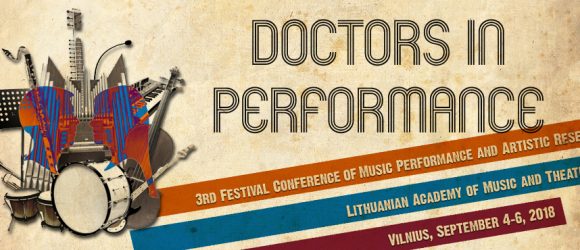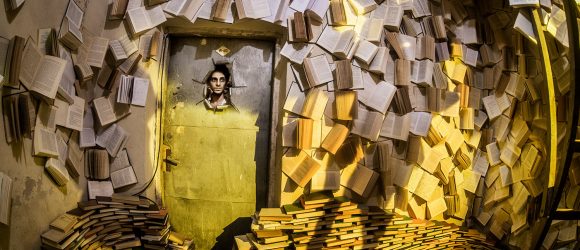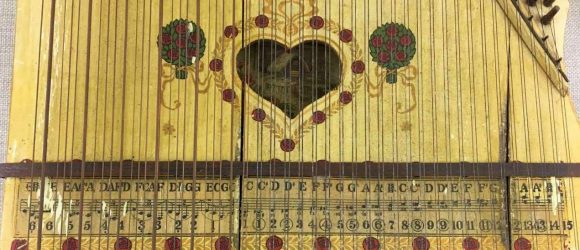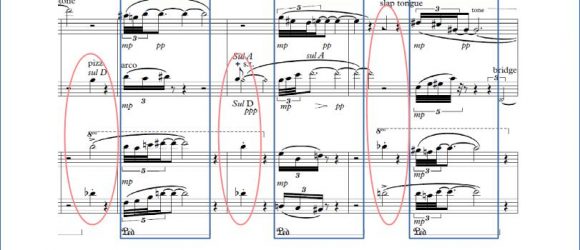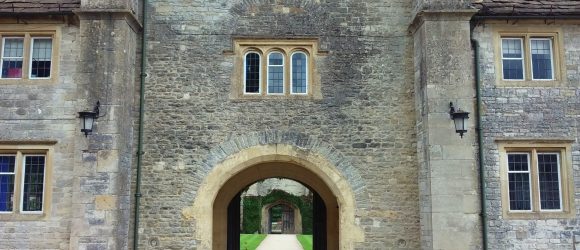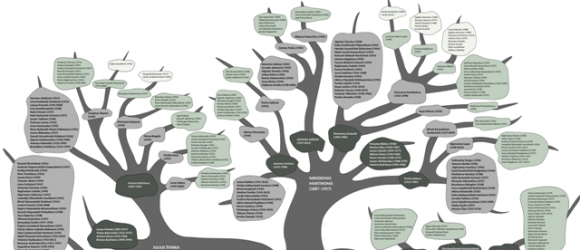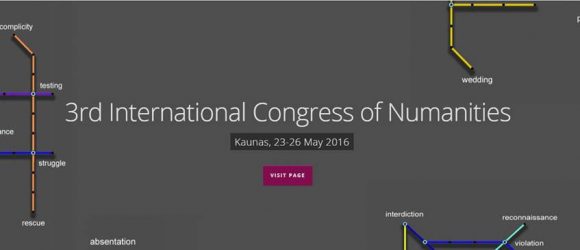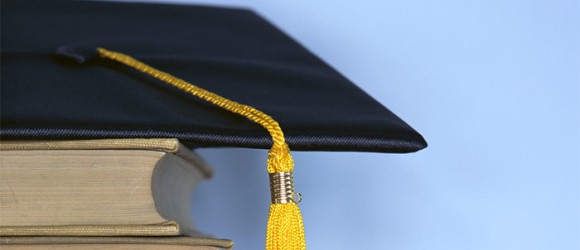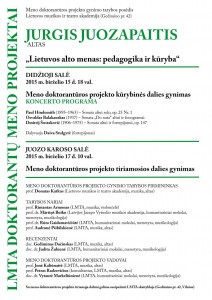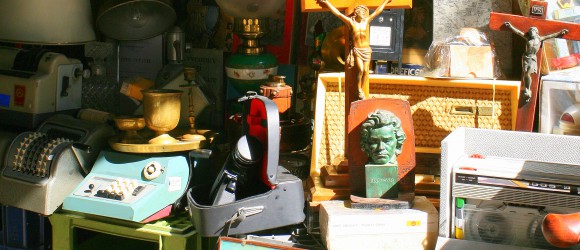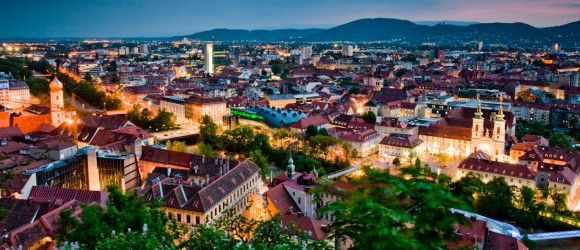Call for papers: “Doctors in Performance” 2018
- 2018-01-19
- | News
Lithuanian Academy of Music and Theatre invites artistic research performers at doctoral and post-doctoral levels to take part in ‘Doctors in Performance’, the third festival conference of music performance and artistic research. The event will take place in Vilnius, on September 4-6, 2018.
Keynote presenters:
Professor Dr JOHN RINK (University of Cambridge)
Professor VYKINTAS BALTAKAS (Lithuanian Academy of Music and Theatre, Maastricht Academy of Music)
The purpose of the conference is to bring together doctoral candidates and post-doctoral researchers working in the fields of musical performance and practice-based or artistic research in music. ‘Doctors in Performance’ places the emphasis on the music itself with the majority of presentations consisting principally of a musical performance in the form of a recital or a lecture recital related to the research. Shorter paper presentations on relevant fields of artistic research are also welcome.
Presentation proposals
The presentations may consist of a musical performance (solo or chamber music), which can take the form of a recital (40 minutes max, including 10 minutes of research introduction) or a lecture recital (40 minutes max). The music performed is expected to include or relate closely to the contents of the doctoral degree or research the participant is conducting. Paper presentations on artistic research (20 minutes max) are also welcome.
Possible forms for presentations:
Recital 40 minutes (+ 10 minutes discussion)
Lecture recital 40 minutes (+ 10 minutes discussion)
Paper presentation 20 minutes (+ 10 minutes discussion)
The conference language is English and all presentations should be in English.
Proposals should be sent by the 1st of April in Word format and should include the following:
- name, surname, title of the presenter/s;
- institutional affiliation;
- photo (as a separate tiff/jpg file);
- a detailed programme of the recital: composers, work titles, composition years, opus numbers;
- a title and written summary of the candidate’s research topic (500 words maximum);
- curriculum vitae (150 words maximum) and contact information;
- equipment needed for performances and presentations (instruments, data projectors, etc.).
For the submission please use the template provided in the Documents section at https://harps.lmta.lt/en/events/doctors-in-performance/. The completed proposals must be sent to Lina Navickaitė-Martinelli at the email address harps@lmta.lt. The proposals will be peer-reviewed anonymously.
The timetable for this process is as follows:
January 18: Circulation of the call;
April 1: Deadline for submissions;
May 15: Results communicated to the applicants and launch of registrations;
September 4–6: DIP 2018.
Publication
Conference abstracts for Doctors in Performance 2018 will be published in advance on the conference website and in print. This will serve as a concert programme as well as provide background information about the participants and their research topics. The applicants are therefore strongly encouraged to include written comments discussing how their artistic and other research work support each other and towards which common goal they are directed. Peer-reviewed publication of selected conference proceedings is intended.
Further information
Doctors in Performance 2018 is organised by HARPS, Hub for Artistic Research and Performance Studies at the Lithuanian Academy of Music and Theatre. For further information, please contact: Dr. Lina Navickaitė-Martinelli at harps@lmta.lt and/or visit the website of the conference: https://harps.lmta.lt/en/events/doctors-in-performance/.
Defense of the artistic research project “Composing Methods of Musical Narration in Postdramatic Theatre”
- 2017-12-18
- | News
On December 19–20, 2017, the defense of Rita Mačiliūnaitė-Dočkuvienė’s artistic doctorate project “Composing Methods of Musical Narration in Postdramatic Theatre” will take place at the Lithuanian Academy of Music and Theatre. Artistic supervisor of the project – Prof. Mindaugas Urbaitis, research supervisor – Prof. Dr. Antanas Kučinskas, research consultant – Prof. Dr. Rasa Vasinauskaitė. Copies of the research paper and its summary are available at the library of the Lithuanian Academy of Music and Theatre (Gedimino pr. 42).
Free entrance.
Defense of the creative part of the artistic doctorate project
December 19, 2017, 5 p.m.
MUSIC INNOVATION STUDIES CENTRE (Gedimino pr. 42, Vilnius)
CONCERT PROGRAM
Rita Mačiliūnaitė-Dočkuvienė (1985)
Contemporary dance performance W(o)men (2013) – 9′ (fragments)
Phantasmagoria of puppetry, masks and physical theatre Sandman (2014) – 18′ (fragments)
Chamber opera To the Lighthouse (2017) – 33′ (fragments)
Defense of the artistic research paper
December 20, 2017, 10 a.m.
LMTA JUOZAS KAROSAS HALL (Gedimino pr. 42, Vilnius)
CHAIR OF THE DEFENSE BOARD OF ARTISTIC RESEARCH PROJECT – Prof. Dr. Ričardas Kabelis (Lithuanian Academy of Music and Theatre, Music, Composition);
BOARD MEMBERS: Prof. Vaclovas Augustinas (LMTA, Music, Composition), Prof. Dr. Rūta Stanevičiūtė-Kelmickienė (LMTA, Humanities, Art Research, Musicology), Assoc. Prof. Hans Peter Stubbe Teglbjærg (The Royal Danish Academy of Music, Music, Composition), Prof. Dr. Audronė Žiūraitytė (LMTA, Humanities, Art Research, Musicology);
REVIEWERS: Assoc. Prof. Dr. Ramūnas Motiekaitis (LMTA, Music, Composition), Assoc. Prof. Dr. Judita Žukienė (LMTA, Humanities, Art Research, Musicology).
Abstract
The preset artistic research paper distinguishes and analyses a form of postdramatic theatre that is characterised by the dominance of music discourse which rejects the dramatic text or its coherency. The author refers to this form as postdramatic musical narration theatre (further – PMNT). It is emphasised that the author discusses a specific type of theatre which has arisen from the theatricalisation of musical events, where a wider music discourse gives rise to a new meaning of performance’s musical score. PMNT is understood as the musicalisation of dramatic narrative or the creation of a new musical narrative/discourse characteristic to postdramatic theatre. This research revealed that musical narration can be composed by a composer (using music notation or pre-prepared soundtracks), created during rehearsals, during the process of devising-communication with the help of actors’/musicians’ vocal abilities, physical movement, gestures, changes of locations, special features of the space, as well as being influenced by other factors (like sound effects and media technologies) and audience’s perception.
The choice of this research object was determined not only by the formation of new theatre phenomena and music becoming an equally important element in the overall context of theatre, but also by the personal interests and professional creative work of the author. Because the research object analysed in this thesis is identical to the author’s, as composer’s, creative practice, the author’s research represents both, theoretical and artistic/practical sides and she, in the context of her research, acquires the role of a participative observer. Music is analysed using a narratological aspect, however, not in order to bring it closer to literature, but because of its pre-existent principles of narrational construction. The analysis is conducted in three stages:
- Distinguishing two categories of musical composing:
- composing with the elements of sound;
- musicalisation of theatrical elements;
- These categories, in order to achieve a detailed analysis of composing methods according to the main devices and their attributes, are broken down into smaller groups;
- Discussing the composing methods of narrative discourse on the music level (the analysis of practical examples).
Illustration: theatre play “Code: HAMLET” (dir. Olga Lapina), photo by Dmitrij Matvejev.
Defense of the artistic research project “Changes in the Late 20th and Early 21st Century Concert Kanklės Repertoire and Contemporary Performance Trends”
- 2017-12-13
- | News
On December 14–15, 2017, the defense of Aistė Bružaitė’s artistic doctorate project “Changes in the Late 20th and Early 21st Century Concert Kanklės Repertoire and Contemporary Performance Trends” will take place at the Organum Concert Hall and the Lithuanian Academy of Music and Theatre. Artistic supervisor of the project – Prof. Lina Naikelienė, consultant – Prof. Rūta Rikterė, research supervisor – Prof. Habil. Dr. Daiva Vyčinienė, research consultant – Assoc. Prof. Dr. Laima Budzinauskienė. Copies of the research paper and its summary are available at the library of the Lithuanian Academy of Music and Theatre (Gedimino pr. 42).
Defense of the creative part of the artistic doctorate project
December 14, 2017, 6 p.m.
ORGANUM CONCERT HALL (J. Basanavičiaus str. 26, Vilnius)
CONCERT PROGRAM “THE CONCERT KANKLĖS. TODAY’S MUSIC”
Part 1
Vaida Striaupaitė-Beinarienė (1977) – Vandens atspindžiai (2017, piano/kanklės, transcription for amplified kanklės solo by Aistė Bružaitė, premiere)
Matti Kontio (1984) – Mitä soivat kirkonkellot? (2002, kantele, transcription for kanklės solo)
Valerij Kikta (1941) – “Умирающий Кентавр” из Диптиха по скульптурам Бурделя (1972, harp, transcription for kanklės solo);
“Призрачная колесница Кухулина“ из сюиты Из Оссиана (1968, harp, transcription for kanklės solo)
Kira Maidenberg (1985) – From Circe to Charybde / От Цирцеи к Харибде (2010, kanklės solo)
Kristine Ojala (1973) – 4 spēles (2000, kokles, transcription for kanklės solo)
Part 2
Lukrecija Petkutė (1988) – Religare (2010, violin, kanklės, basoon and double-bass, premiere)
Albertas Navickas (1986) – aš ilgai stovėsiu ant kranto, o tu vis plauksi upe (2010, violin, amplified kanklės, basoon and double-bass, premiere)
Alexander Ryndin (1962) – Magister verba (2017, violin, kanklės and cello, premiere)
Šarūnas Nakas (1962) – Affected Woman (2017, set of kanklės and wind instruments, premiere)
Performers: Aistė Bružaitė (kanklės, amplified kanklės, authentic kanklės), Ingrida Rupaitė-Petrikienė (violin), Tomas Ramančiūnas (cello), Donatas Bagurskas (double-bass), Darius Stoskeliūnas (basoon), Lithuanian Military Wind Orchestra (leader and conductor Egidijus Ališauskas)
Defense of the artistic research paper
December 15, 2017, 9.30 a.m.
LMTA JUOZAS KAROSAS HALL (Gedimino pr. 42, Vilnius)
CHAIR OF THE DEFENSE BOARD OF ARTISTIC RESEARCH PROJECT – Prof. Vytautas Tetenskas (Klaipėda University Academy of Arts, Music, Birbynė);
BOARD MEMBERS: Prof. Vaclovas Augustinas (Lithuanian Academy of Music and Theatre, Music, Composition), Prof. Wilfried Scharf (Anton Bruckner Private University for Music, Dance and Drama, Music, Zither), Prof. Dr. Rūta Stanevičiūtė-Kelmickienė (LMTA, Humanities, Art Research, Musicology), Prof. Dr. Audronė Žiūraitytė (LMTA, Humanities, Art Research, Musicology).
Abstract
In the late 20th century, the concert kanklės repertoire substantially changed. As the kanklės players’ school was getting more professional, increasingly more composers became interested in that Lithuanian instrument and expressed inovative ideas, unusual for the kanklės music performers and audiences, in their compositions. The present research paper chose to analyse the repertoire for the kanklės and chamber ensembles (which included the concert kanklės), its characteristics, and the changes in it in the period from the late 20th to early 21st century; it examined original compositions for the kanklės and conducted an in-depth study of the specificity of the instrument, technical possibilities of its performance, and the diversity of playing techniques. The most important and most striking solo compositions for the kanklės were identified, and their authors were introduced. The classical and contemporary kanklės repertoire, its changes, and the current composition trends were analysed separately. The paper presented a survey and its findings: during the survey, Lithuanian composers and musicologists were interviewed in order to identify their common insights into the concert kanklės opportunities and to evaluate its situation in the contemporary context of professional music. The concert kanklės playing techniques were comprehensively introduced and classified, and the traditional and nontraditional kanklės playing techniques were systematised in a table which also offered their examples and notation symbols. A separate overview of playing the new electric kanklės was included: the instrument has already attracted the attention of composers and got established in the context of contemporary professional music. The paper provided information about the instruments of foreign countries, related to the Lithuanian kanklės, and made attempts to establish certain links in the area of their performance. The latest trends in the compositions for concert kanklės were analysed and related to the implementation of their performance by identifying certain nuances and difficulties that performers tended to face. Four contemporary compositions from the concert kanklės repertoire were analysed (Piece G.r. by Egidija Medekšaitė, Snowing in Magnolia Blossoms by Vytautas Germanavičius, From Circe to Charybde by Kira Maidenberg, and Affected Woman by Šarūnas Nakas) that stood out due to innovative ideas and original playing techniques.
Defense of the artistic research project “Structural and Prestructural Compositional Aspects of Sonoristic Music”
- 2016-11-18
- | News
On December 13–14, 2016, the defense of Andrius Maslekovas’ artistic doctorate project “Structural and Prestructural Compositional Aspects of Sonoristic Music” will take place at the Lithuanian Academy of Music and Theatre. Artistic supervisor of the project – Assoc. Prof. Raminta Šerkšnytė, research supervisor – Prof. Dr. Rimantas Janeliauskas, research consultant – Assoc. Prof. Dr. Mārtiņš Viļums. Copies of the research paper and its summary are available at the library of the Lithuanian Academy of Music and Theatre (Gedimino pr. 42).
Free entrance.
Defense of the creative part of the artistic doctorate project
December 13, 2016, 5 p.m.
MUSIC INNOVATION STUDIES CENTRE (Gedimino pr. 42, Vilnius)
CONCERT PROGRAM
Andrius Maslekovas (1985)
Calligraphies of the Last Rays for clarinet, viola and piano (2014)
Incantation of the Freezing Haze for flute solo (2013)
Dissipating Fragrances for violin and accordion (2015)
…she, who is touching blind water shadows… for violin, cello and piano (2012)
Winter Calligraphies for symphony orchestra and mixed choir (2016, world premiere)
Defense of the artistic research paper
December 14, 2016, 11 a.m.
LMTA JUOZAS KAROSAS HALL (Gedimino pr. 42, Vilnius)
CHAIR OF THE DEFENSE BOARD OF ARTISTIC RESEARCH PROJECT – Prof. Vaclovas Augustinas (Lithuanian Academy of Music and Theatre, Music, Composition);
BOARD MEMBERS: Prof. Dr. Rytis Ambrazevičius (LMTA, Humanities, Art Research, Musicology), Prof. Habil. Dr. Gražina Daunoravičienė (LMTA, Humanities, Art Research, Musicology), Assoc. Prof. Rolands Kronlaks (Jāzeps Vītols Latvian Academy of Music, Music, Composition), Prof. Rytis Mažulis (LMTA, Music, Composition);
REVIEWERS: Assoc. Prof. Dr. Ričardas Kabelis (LMTA, Music, Composition), Prof. Dr. Antanas Kučinskas (LMTA, Humanities, Art Research, Musicology).
Abstract
Until the second half of the 20th century manipulation of pitch existed as an indisputable paradigm of musical organisation. However, increased significance of timbre and loudness has infirmed the established hierarchical system of musical parameters, turning the dimension of sound quality into a central element in the construction of a musical piece. Works by such composers as György Ligeti, Krzysztof Penderecki, Witold Lutosławski or Helmut Lachenmann may be regarded as an outburst of said transformations, and along the new aesthetic and constructive ideas that their music contained, it may even be regarded as a paradigmatic turn. The said paradigmatic transformations of compositional construction also prevail in the works by such present-day composers as Mathias Pintscher, Johannes-Maria Staud, Ondřej Adámek, Kaija Saariaho, Harrison Birthwistle, Toshio Hosokawa and others. However, even after nearly six decades since the sound quality has become an aesthetic category and this paradigm has blossomed in a variety of forms and shapes, the methodologies of contemporary music analysis are unable to disclose the essential compositional aspects of this music or the causal dependence behind them. This research paper aims to explain compositional principles of this music and the origins of their emergence. Fields of psychoacoustics and cognitive psychology are employed here. In the light of this knowledge the key aspects of impact of sound parameters on formation of sonoricity is explained, as well as impact of principles of Gestalt perceptual grouping on the communication system that prevails in sonoristic music. The work contains detailed analyses of various communicational levels, that are illustrated in the examples from pieces by Ondřej Adamék, Sofia Gubaidulina, Andrius Maslekovas, Ramūnas Motiekaitis, Mathias Pintscher, Doina Rotaru, Johannes-Maria Staud and many other composers. The last chapter of the thesis is dedicated to the analysis of the oeuvre of Andrius Maslekovas. All structural and prestructural aspects that are discussed throughout this work are being unveiled in detailed analyses of “Calligraphies of the Last Rays” for clarinet, viola and piano (2014) and “Incantation of the Freezing Haze” for flute solo (2013).
Fourth Performance Studies Network International Conference, 14-17 July 2016
- 2016-07-17
- | News
Different sessions of the conference featured topics as diverse as creative experimentation, networking technologies, cultural identity, relations between analysis and performance, historically-informed performance, issues of performance pedagogy, performance art as a listening experience, recording practices, electronic/electroacoustic music, composer-performer collaborations, performance philosophy, virtuosity, authorship and agency, concert programming and others.
Two keynote lectures-concerts of the conference were related to ensemble performance: Neil Heyde with the Kreutzer Quartet, Michael Finnissy and Laurie Bamon, on ‘Inventing an ensemble identity’, and Peter Wiegold with Notes Inégales and guest artists Hyelim Kim (Korean taegŭm flute) and Cheng Yu (Chinese pipa/qu-chin), on ‘Leadership and ownership’.
More information can be found at the conference’s website: https://psn2016.org/
Artistic research project “Lithuanian Schools of Choral Conducting: Identifications, Interactions and Modernisation” defended
- 2016-07-15
- | News
On June 14–15, 2016, the defense of Egidijus Kaveckas’ artistic doctorate project “Lithuanian Schools of Choral Conducting: Identifications, Interactions and Modernisation” will take place at…. and the Lithuanian Academy of Music and Theatre. Artistic supervisor of the project – Prof. Vytautas Miškinis, consultant – Prof. Gintaras Rinkevičius; research supervisor – Prof. Habil. Dr. Gražina Daunoravičienė, consultant – Prof. Povilas Gylys.
Defense of the creative part of the artistic doctorate project
June 14, 2016, 7 p.m.
VILNIUS ST. PHILIP AND ST. JACOB THE APOSTLES’ CHURCH (Vasario 16-osios str. 11, Vilnius)
CONCERT PROGRAM
Maurice Duruflé (1902–1986) – Requiem Op. 9
Performers: Milda Baronaitė (soprano), Sandra Lebrikaitė (mezzo-soprano), Vilnius Municipal Choir “Jauna muzika” (artistic leader – Vaclovas Augustinas), the choir of the State Song and Dance Ensemble “Lietuva” (leader – Algimantas Kriūnas), State Choir “Polifonija” (leader – Aurelija Čižauskaitė), St. Christopher Chamber Orchestra (artistic leader – Donatas Katkus), Lithuanian Armed Forces Orchestra (artistic leader – Egidijus Ališauskas).
Defense of the artistic research paper
June 15, 2016, 1 p.m.
LMTA JUOZAS KAROSAS HALL (Gedimino pr. 42, Vilnius)
CHAIR OF THE DEFENSE BOARD OF ARTISTIC RESEARCH PROJECT – Prof. Jurijus Kalcas (Lithuanian Academy of Music and Theatre, Music, Choral conducting);
BOARD MEMBERS: Prof. Toomas Kapten (Estonian Academy of Music and Theatre, Music, Conducting), Prof. Habil. Dr. Leonidas Melnikas (Lithuanian Academy of Music and Theatre, Humanities, Art Research, Musicology), Prof. Česlovas Radžiūnas (Lithuanian Academy of Music and Theatre, Music, Choral conducting), Prof. Dr. Audronė Žiūraitytė (Lithuanian Academy of Music and Theatre, Humanities, Art Research, Musicology);
REVIEWERS: Assoc. Prof. Gintautas Venislovas (Lithuanian Academy of Music and Theatre, Music, Choral conducting), Assoc. Prof. Dr. Judita Žukienė (Lithuanian Academy of Music and Theatre, Humanities, Art Research, Musicology).
Summary
The conductor’s professionalism, creative touch, aspirations, repertoire strategy and other elements of creative work rely quite heavily on the school of teaching. The Lithuanian choir culture is intertwined with the so-called pedagogical school of choral conducting where the teacher transfers knowledge to the student. These links consolidate the models and aspects of creative orientations, technological attitudes, skills of the trade and often sources of the creative position. In this research project, the definition of the pedagogical school of composers formulated in the works of Algirdas Jonas Ambrazas (1969, 1991) adapted to the school of choir conductors is based on the general school components (programme, teacher, students) recording the specific place, time and tradition.
A structural component model is created representing choral conducting pedagogical school; it helps to refine the Lithuanian choral conducting pedagogical schools’ contours. In order to reach the necessary methodological sustainability and a richer, more specific installation of definitions system, an attempt was made to synthesize conducting and choreography arts. For this purpose, the Movement Analysis theory, an adapted version for conducting by Hungarian choreographer Rudolf J. Laban , was invoked and it was first published in his Kinetographie (1928).
The historiographical, comparative, structural-systemic, descriptive-analytical and other research methods are used to reveal the way in which national or individual pedagogical schools of choral conducting emerge; the principles of their functioning and interaction; how the teaching choirmaster, his creative work, specific manual techniques, interpretational attitudes or ideals continue to contribute to the further development of choir art through their students; modernisation of the Lithuanian school of choral conducting, etc. The conceptual framework of the research topic covers not only the problems of schools of choral conducting and Lithuanian choir music art but also a systematic study of the Lithuanian cultural progress.
HARPS goes ICON
- 2016-05-23
- | News
The 3rd International Congress of Numanities “Processes, Maps, Narratives”, organized by the International Semiotics Institute, takes place on May 23-26 at the Kaunas University of Technology. HARPS’s activities are featured in one of the sessions of the congress, which is called “Mapping the Tools of Performance Studies and Artistic Research”. The session (directed by the HARPS coordinator Lina Navickaitė-Martinelli) features a variety of topics meant to overview the recent trends and methodological as well as thematic directions of artistic research and performance studies. The following papers will be presented: “The Play-Write: Scripts and Narratives of Artistic Research in Music Performance“ (Assoc. Prof. of LMTA, Dr. Lina Navickaitė-Martinelli), “Mapping the Process of Piano Improvisation“ (artistic doctorate researcher of LMTA Mykolas Bazaras), “”György Ligeti’s Études for Piano” Book I: Contribution to the Concept of a Versatile Pianist / Processing New Guidelines for Piano Performers“ (artistic doctorate researcher of LMTA Motiejus Bazaras), “Aspects of Artistic Research within the Sound-Image Studies“ (artistic doctorate researcher of Vilnius Arts Academy Vygintas Orlovas), “Artistic Research as an Urge of New Knowledge“ (Assoc. Prof. of LMTA, Dr. Ramunė Balevičiūtė), “At a Crossroads: New Media, Performance Art, and Three Projects of Eva and Franc Mattes” (Assist. Prof. at the School of Media and Audiovisual Culture, University of Lodz Dr. Dagmara Rode), “The Process of Transcultural Communication in Artistic Research: Flamenco Meets Sutartinė” (artistic doctorate researcher of LMTA Brigita Bublytė), and “The Use of Verbal Tools in Postdramatic Theatre of Musical Narration” (artistic doctorate researcher of LMTA Rita Mačiliūnaitė-Dočkuvienė).
On May 25, the artistic program of the Congress will be enriched by the screening of “Sutarmenko – A Marriage of Sutartinės and Flamenco”, a documentary on the two cultural traditions introduced by the project’s author and performer Brigita Bublytė.
Defenses of two artistic research projects at the Lithuanian Academy of Music and Theatre
- 2015-06-14
- | News
On June 15-17, 2015 there will be two artistic doctorate projects defended at the Lithuanian Academy of Music and Theatre: Jurgis Juozapaitis’ „Lithuanian Viola Art: Pedagogy and Creative Works“ and Žilvinas Smalys’ „Buffet versus Heckel: The Interactions and Confrontations of Two Bassoon Systems“.
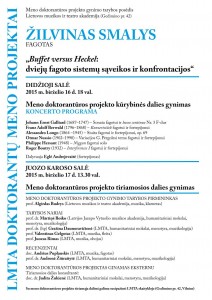
Vytautas Landsbergis Prize awarded to a monograph on music performance art
- 2015-05-08
- | News
The Best Musicology Works Awards ceremony took place on May 4, 2015, at the Lithuanian Music and Theatre Academy, where the Musicological section of the Lithuanian Composers’ Union handed Ona Narbutienė, Vytautas Landsbergis and Lithuanian Composers’ Union prizes for the best musicological works of the year 2014.
Vytautas Landsbergis Prize was awarded to the performance studies scholar Lina Navickaitė-Martinelli for innovative research on piano performance art in her monograph Piano Performance in a Semiotic Key: Society, Musical Canon and Novel Discourses (in English language, released by the Semiotic Society of Finland). 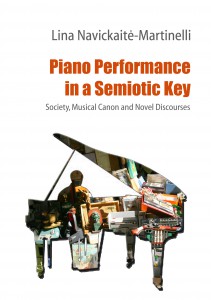 According to the composer and musicologist Ramūnas Motiekaitis, „It is evident that this book will encourage the performers to reflect consciously, and perhaps more critically, about their activities as well as shall help in finding solid arguments underlying one or another interpretative choice. Looking from the pragmatic perspective, it may even offer to someone apt marketing strategies. While looking at the present study philosophically, semiotic consciousness would arise, i.e. realizing that whatever is one‘s identity, it will never exist in a monadic modus for and of itself, but only in a relationship with and through the other. Such prospects should not be overlooked when reflecting our activities as performers, composers or musicologists.”
According to the composer and musicologist Ramūnas Motiekaitis, „It is evident that this book will encourage the performers to reflect consciously, and perhaps more critically, about their activities as well as shall help in finding solid arguments underlying one or another interpretative choice. Looking from the pragmatic perspective, it may even offer to someone apt marketing strategies. While looking at the present study philosophically, semiotic consciousness would arise, i.e. realizing that whatever is one‘s identity, it will never exist in a monadic modus for and of itself, but only in a relationship with and through the other. Such prospects should not be overlooked when reflecting our activities as performers, composers or musicologists.”
Ona Narbutienė Prize was awarded to the Lithuanian erudite, essayist, historian Jonas Vytautas Bruveris for the consistent development of aesthetic ideas and the diversity of contexts in the book Historical Contexts of Lithuanian Music (published by the Lithuanian Academy of Music and Theatre). Lithuanian Composers’ Union Prize was awarded to Svetlana Barkauskas for a detailed rendering of the composer’s creative odyssey in her book Seven Symphonies of Vytautas Barkauskas (published by the Lithuanian Composers’ Union).
The contest of the best Lithuanian works in musicology is held every spring since 2004. It offered awards for the last year’s most outstanding work in various fields of musicology, as well as research and popularizing of the Lithuanian musical culture. The founders of the awards are the Lithuanian Composers’ Union and Vytautas Landsbergis Foundation. The musicological works of 2014 were evaluated by the panel of seven experts: Šarūnas Nakas (Chairman), Beata Baublinskienė, Živilė Stonytė-Tamaševičienė, Rima Povilionienė, Jūratė Katinaitė, Ramūnas Motiekaitis and Jonas Vilimas.
Info by the Musicological section of the Lithuanian Composers‘ Union.
EPARM 2015 in Graz, Austria
- 2015-04-23
- | News
The European Platform for Artistic Research in Music (EPARM) Conference 2015 takes place at the University of Music and Performing Arts Graz (KUG) on 23-25 April. The theme of this year’s forum is “(Re-)processing Research: musical practice as both source and target domain for artistic research in music”. The participants were encouraged to raise the following questions in their presentations:
• Do I integrate findings of my artistic research in my own artistic practice – including teaching practice – , and if so, how?
• Who are the peers I am relating to in my own artistic research project, and how do I relate to them? And what is the impact of this relationship with peers?
• Can I provide convincing examples of artistic research where it is very obvious that the artistic material itself makes the argument?
• Can I provide any evidence from my own experience that music, and our general understanding of it, can be transformed by the outputs of artistic research? And if so, are the effects of such transformation the same as, or different from, those of a purely artistic performance?
In addition to the plenary lectures and conference presentations, an Information Forum is scheduled for April 23, where HARPS co-ordinator Dr. Lina Navickaitė-Martinelli is presenting the past and current activities of the platform (“HARPS: Artistic Research and Performance Studies at the Lithuanian Academy of Music and Theatre”).
The program of EPARM 2015 can be seen at the website of AEC, http://www.aec-music.eu/events/


